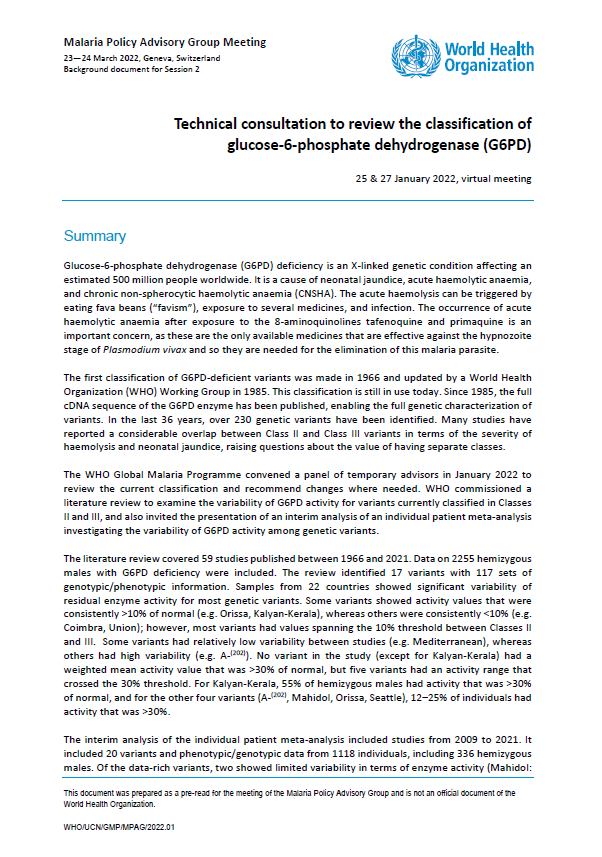Last Updated: 21/12/2022
Operational Feasibility of appropriate radical cure of Plasmodium vivax with Tafenoquine or Primaquine after quantitative G6PD testing in Brazil
Objectives
To investigate whether Plasmodium vivax patients ≥16 years are treated with tafenoquine (TQ) in accordance with the appropriate level of glucose-6-phosphate dehydrogenase (G6PD) enzyme activity.
Secondary objectives:
- To investigate whether P. vivax patients ≥6 months are treated with primaquine (PQ) in accordance with the appropriate level of G6PD enzyme activity.
- To describe the characteristics of patients treated with TQ or PQ.
- To measure frequency of drug-induced acute haemolytic anemia (AHA) and hospitalization due to drug-induced AHA.
Doctor Heitor Vieira Dourado Foundation for Tropical Medicine (FMT-HVD), Brazil
The study design is based on the secondary use of data routinely collected from all malaria patients in the Epidemiological Surveillance Information System for Malaria (SIVEP-Malaria) by the Ministry of Health (MS). Data from all malaria patients are routinely collected through SIVEP forms by health professionals (HP) and entered into the SIVEP database by the municipality staff.
The SIVEP form will be adapted by the MS to collect information about the G6PD test, TQ treatment and signs of hemolysis. The retrospective data from all patients will be entered into a new database by the municipality staff during the study period and the relevant data will be automatically exported weekly to the SIVEP database. The study team will only have access to unidentified data, according to the access levels that will be assigned to each member in the system. Only the municipality’s team will have access to the identified patient data. In addition to the data collected on the SIVEP forms, the PR team will ask the two referral hospitals that routinely receive all admissions due to AHA to perform a regular screening of electronic hospital admission records for patients with signs of AHA (renal failure, jaundice, blood transfusion, malaria). All identified cases will be investigated using hospital records and SIVEP forms. Confirmed information about drug-induced AHA will be linked to the patient record recorded in the database. The PR team will also contribute to pharmacovigilance training. Physicians at tertiary-level health units will report side effects through the VigiMed system, from the National Health Surveillance Agency (ANVISA).Finally, the additional costs of implementing the G6PD and TQ tests will be collected along with the study at the health facilities.
- Observational Model: Ecologic or Community
- Time Perspective: Prospective
ClinicalTrials.gov Identifier: NCT05096702
Sep 2021 — Sep 2023

